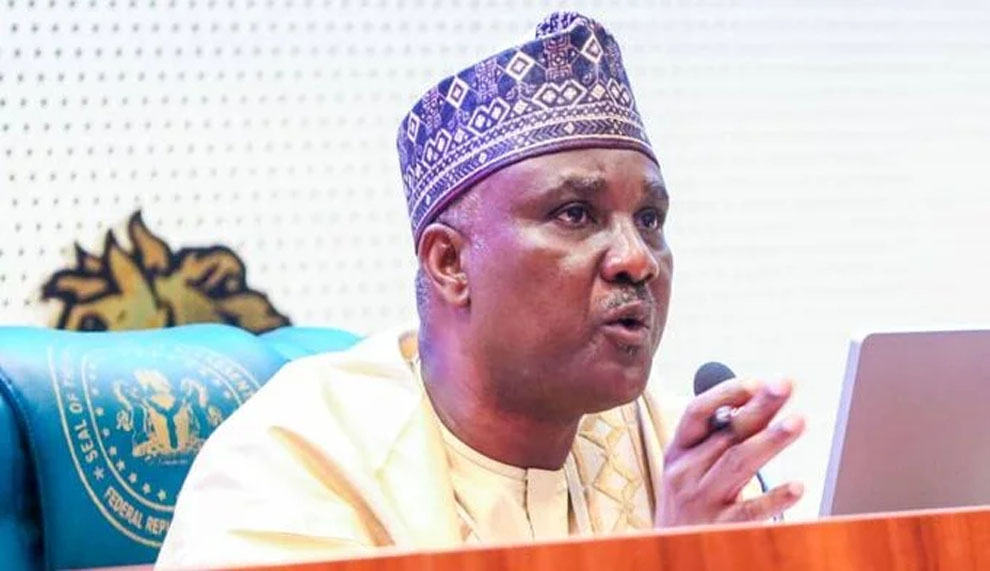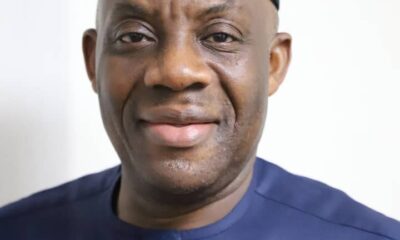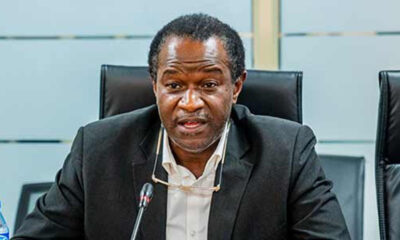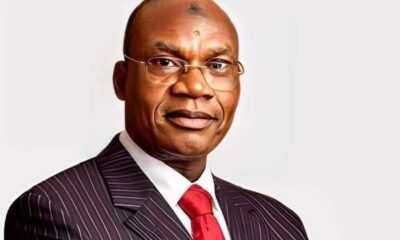News
Federal Govt eases access to student loan in new proposal

Federal Govt eases access to student loan in new proposal
A major rejig of the student loan scheme of the Federal Government has been proposed for legislation by the National Assembly.
The new plan will ease loan access by students.
It was sent yesterday as an Executive Bill to the Senate and the House of Representatives for consideration and passage.
Yesterday would have been the official kick-off of the programme, but it was shifted indefinitely.
The new Bill seeks to scrap the Student Loan Act, which is to be substituted.
President Bola Ahmed Tinubu on June 12, 2023, signed into law the Student Loan Bill to provide interest-free loans to Nigerians seeking higher education.
It was sponsored by former House of Representatives Speaker Femi Gbajabiamila, now Chief of Staff to the President.
It was introduced in 2016 as part of measures to address the funding gaps in tertiary education.
The new Bill got expeditious consideration at the two chambers.
It spells out the funding structure and other conditions attached to the loan.
The Bill, which scaled the first and second reading on Day 1, proposes one per cent of all collectable revenue by the Federal Inland Revenue Service (FIRS) to fund the scheme.
The hurdles of a guarantor, a parent’s debt profile and others in the old Act have been removed in the new Bill, thereby making it easier for the loan to be accessed.
The Senate and House received from the President a bill which seeks to amend the Students Loan (Access to Higher Education) Act, 2023.
READ ALSO:
- Olubadan to be buried according to Islamic rites Friday – Family
- Insecurity: U.S ready to help Nigeria tackle kidnappings – FG
- Israel-Hamas war: Israeli forces attack UN aid centre, kill scores, injure many in Gaza
The President’s letter was read by Senate President Godswill Akpabio and Speaker Tajudeen Abass.
The letter is titled: “Transmission of Students Loans (Access to Higher Education) (Repeal and Reenactment) Bill 2024” and is dated March 14, 2024.
It reads: “Pursuant to Section 58(2) of the Constitution of The Federal Republic of Nigeria, 1999 (as amended), I forward, herewith, the Student Loan (Access to Higher Education) (Repeal and Re-Enactment) Bill, 2024 for the kind consideration of the House of Representatives.
“The Student Loan (Access to Higher Education) (Repeal and Re-Enactment) Bill, 2024 seeks to enhance the implementation of the Higher Education Student Loan Scheme by addressing challenges related to the management structure of the Nigerian Education Loan Fund (NELF), applicant eligibility requirements, loan purpose, funding sources and disbursement and repayment procedures.”
The President said he hoped the bill would “receive the usual expeditious consideration of the” lawmakers.
Both chambers suspended their relevant rules and passed the Bill for first reading.
They, thereafter, referred the Bill to the Committee of the Whole where they separately considered and passed it for Second Reading.
The proposal is entitled: “A Bill for an Act to Repeal the Students Loans (Access to Higher Education) Act, 2023 and Enact the Student Loans (Access to Higher Education) Bill, 2024 to Establish the Nigerian Education Loan Fund as a Body Corporate to Receive, Manage and Invest Funds to Provide Loans to Nigerians for Higher Education, Vocational Training and Skills Acquisition and for Related Matters”
All the lawmakers who contributed to the debate on the Bill in both chambers agreed that it should be passed as quickly as possible to boost education access.
A significant amendment being sought, according to a policy brief, includes “the establishment of the Nigeria Education Loan Fund (NELFUND) as a body corporate that can sue and be sued in its name and has the power to acquire, hold, and dispose of movable and immovable property for the purpose of its functions”.
On eligibility criteria for applicants, the new Bill removes the family income threshold to enable Nigerian students to apply for loans and accept responsibility for repayment according to the Fund’s guidelines.
READ ALSO:
- Muslim Council sensitizes clerics on preaching methodology
- Order stoppage of continuous harassment, intimidation of Chioma Okoli by Erisco Foods, SERAP urges Tinubu
- Dortmund beat PSV to reach UCL quarters
It also removes the guarantor requirement so that students can apply for and receive loans subject to application and identity verification guidelines as provided by the Fund.
Student applicants can no longer be disqualified based on their parent’s loan history.
The Bill establishes a justice and fairness provision mandating the Board to ensure a minimum national spread of loans approved and disbursed in each financial year.
Applicants to the Fund may apply for loans to cover tuition and other fees payable to the school and maintenance allowance payable to the student.
On repayment of loans, the Bill indicates that beneficiaries of the Fund shall begin as soon as the beneficiary becomes employed in any capacity.
According to the brief, the Fund shall not initiate loan recovery efforts until two years after the completion of the National Youth Service Corps (NYSC) programme.
It states that a beneficiary may request an extension of enforcement action by the Fund by providing an affidavit indicating that he is not employed in any capacity and is not receiving any income.
It provides out that any person who provides a false statement to the Fund under this section is guilty of a felony and is liable to imprisonment for three years.
It makes provision for loan forgiveness in the event of death or acts of God causing inability to repay.
The brief says: “NELFUND can legally enter contracts, including loan agreements and may also initiate action to ensure repayment by beneficiaries.
“It also empowers the Fund to provide loans to qualified Nigerians for tuition, fees, charges, and upkeep during their studies in approved tertiary education institutions and vocational and skills acquisition institutions in Nigeria.
“It empowers the Fund to build, operate, and maintain a diversified pool of funds to provide loans to qualified applicants and ensure access to higher education, vocational training, and skills acquisition.”
“These changes will ensure that students can apply for and receive loans to cover tuition, institutional charges and some upkeep costs.
“It also separates the governance functions from the management operations of the NELFUND by establishing a Board of Directors with a Chairman and Secretary.
“The board’s members are drawn from the relevant ministries, regulatory bodies, and participating agencies, including the Federal Ministries of Finance and Education, the Federal Inland Revenue Service (FIRS), National Identity Management Commission (NIMC), National Universities Commission (NUC), National Board for Technical Education (NBTE), and National Commission For Colleges of Education (NCCE), as well as representatives of universities, polytechnics, and colleges of education, students of tertiary institutions, and the organised private sector.
“It also properly defines the resource structure of the Fund by, amongst other things, establishing the General Reserve Fund into which shall be paid one per cent of all taxes, levies and duties collected by the FIRS and accruing to the benefit of the Federal Government of Nigeria.”
Federal Govt eases access to student loan in new proposal
News
Ohanaeze Ndigbo President-General raises alarm over threats to his life

Ohanaeze Ndigbo President-General raises alarm over threats to his life
Emmanuel Iwuanyanwu, the President-General of Ohanaeze Ndigbo, has expressed concern over threats to his life by individuals he described as anti-Igbo. He revealed that there have been plans to either kill him or burn his house due to his leadership of Ndigbo.
Addressing a press conference in Enugu, Iwuanyanwu highlighted the dangers he faced, mentioning the death of his predecessor, Prof George Obiozor, and an attempt on another ex-leader’s life. He recounted receiving information about people hired to attack him but assured that he remained undeterred in his commitment to serving his people.
READ ALSO:
- Your husband is not your partner, he is the head – Daddy Freeze tells Nigerian women
- Cleric allegedly sets wife’s house ablaze following prayer disagreement in Ekiti
- UCL: Real Madrid beat Bayern to book final ticket …to face Dortmund in London
Iwuanyanwu lamented being confronted by such threats despite his efforts to serve his people, citing his extensive career and scholarship schemes that benefited thousands of youths. He recalled the fate of late Prof. Joe Irukwu, who faced similar accusations of working against the interest of Igboland.
Despite the challenges, Iwuanyanwu reaffirmed his determination to serve Ndigbo and vowed not to yield to intimidation.
Ohanaeze Ndigbo President-General raises alarm over threats to his life
News
Rivers crisis festers as new factional Speaker emerges

Rivers crisis festers as new factional Speaker emerges
A new speaker has emerged in Rivers State Wednesday May 8, 2024, to signal the much-awaited showdown in state’s deteriorating political crisis which seems to be here.
Already, hidden cards or fists are appearing every hour to show that both the Nyesom Wike camp and the Governor Siminalayi Fubara camp have been preparing for it.
The Wike camp through the Rivers State caretaker committee of the All Progressives Congress (APC) led by Tony Okocha yesterday gave go-ahead for impeachment action against the governor. The one they one the 27 defected lawmakers loyal to Wike initiated on October 30, 2023, failed when Gov Fubara fought back until a temporary ceasefire was achieved in Aso Rock with an 8-point agreement signed by both parties but largely observed in breach.
Now, it seems both camps have rearmed and may be ready for the final showdown that may make Rivers State tense in the coming days, to say the least.
READ ALSO:
- Cybersecurity levy suspension tears lawmakers apart, speaker overrules
- EFCC to arraign Sirika, daughter over fresh N2.7 billion contract scam
- Breaking: Fubara bars all LGA heads from appearing before Rivers Assembly
The APC has directed that impeachment begin immediately; the next day, the Fubara camp announced their own Speaker, Victor Oko Jumbo from Bonny; same day, hints emerge that screening of LGA caretaker committee members may be going on.
On the other hand, the local councils have staged protests saying their monthly allocations have been withheld. Pressure is thus mounting from that angle covering the 23 local council areas.
The purported screening may lead to appointment of caretaker committees of the 23 LGAs in the state who would get the monthly allocations and hit the ground running.
This action would provoke what the Wike-backed APC group said they would resist. They may begin their own action in the form of impeachment proceedings which the Fubara camp (Rivers State government) said they would resist.
These acts of resistance may plunge the state into violence and make it ungovernable. At that point, President Bola Ahmed Tinubu, who has remained silent since the peace agreement, may unveil the sanctions he had threatened would descend on any person who breached the agreement. Each camp points to the other as the one breaching the agreements. Each clings to Tinubu as the favourite.
The battle seems timed to ensure that the one year anniversary is hindered.
Rivers crisis festers as new factional Speaker emerges
News
Cybersecurity levy suspension tears lawmakers apart, speaker overrules

Cybersecurity levy suspension tears lawmakers apart, speaker overrules
The Speaker of the House of Representatives, Abbas Tajudeen, intervened on Wednesday to halt a motion calling for the suspension of the controversial cybersecurity levy, which has sparked widespread dissatisfaction among Nigerians.
Since the Central Bank of Nigeria (CBN) mandated all banks to deduct 0.5% of the value of electronic transactions from customers, Nigerians from various sectors have vehemently opposed the levy, labelling it an additional financial burden.
During Wednesday’s plenary session, Manu Soro, a lawmaker from Bauchi State, presented the motion, citing concerns about the timing of the levy’s introduction amidst Nigeria’s prevailing economic challenges.
Soro argued that imposing new taxes or increasing existing ones amid the current economic difficulties exacerbated by the removal of fuel subsidies and currency depreciation would only add to citizens’ financial woes.
READ ALSO:
- EFCC to arraign Sirika, daughter over fresh N2.7 billion contract scam
- Breaking: Fubara bars all LGA heads from appearing before Rivers Assembly
- Russia urges Israel to comply with international humanitarian law in Rafah
He called on the House to urge the CBN to retract the circular on the cybersecurity levy and halt its implementation immediately. Additionally, he urged the Minister of Finance to refrain from introducing new taxes or raising existing rates until the economic situation improves significantly.
However, Speaker Abbas advised Soro to temporarily withdraw the motion to allow the House leadership to deliberate on the best course of action to address the issue.
In a related development, the Trade Union Congress of Nigeria (TUC) threatened to shut down the economy over the plan to implement the cybersecurity levy on electronic transactions. TUC’s president, Mr. Festus Osifo, criticized the levy as illogical, particularly given the current economic challenges faced by Nigerians. He warned that its implementation could worsen poverty and deepen the economic crisis in the country.
Cybersecurity levy suspension tears lawmakers apart, speaker overrules
-

 International2 days ago
International2 days agoNetanyahu rubbishes Hamas ceasefire proposal
-

 metro8 hours ago
metro8 hours agoCleric allegedly sets wife’s house ablaze following prayer disagreement in Ekiti
-

 metro1 day ago
metro1 day ago33 states face flooding risk, NEMA warns
-

 Politics2 days ago
Politics2 days agoAbia deputy gov candidate, lawmaker dump PDP
-

 News3 days ago
News3 days agoNigerian varsity VC suspended over alleged gross misconduct
-

 Health1 day ago
Health1 day agoForeigners now visit Nigeria for plastic surgery, others – Minister
-

 metro2 days ago
metro2 days agoThree siblings attack school teacher for flogging brother in Port Harcourt
-

 Education2 days ago
Education2 days agoJAMB releases more results, says no one obtained scores without writing UTME

















